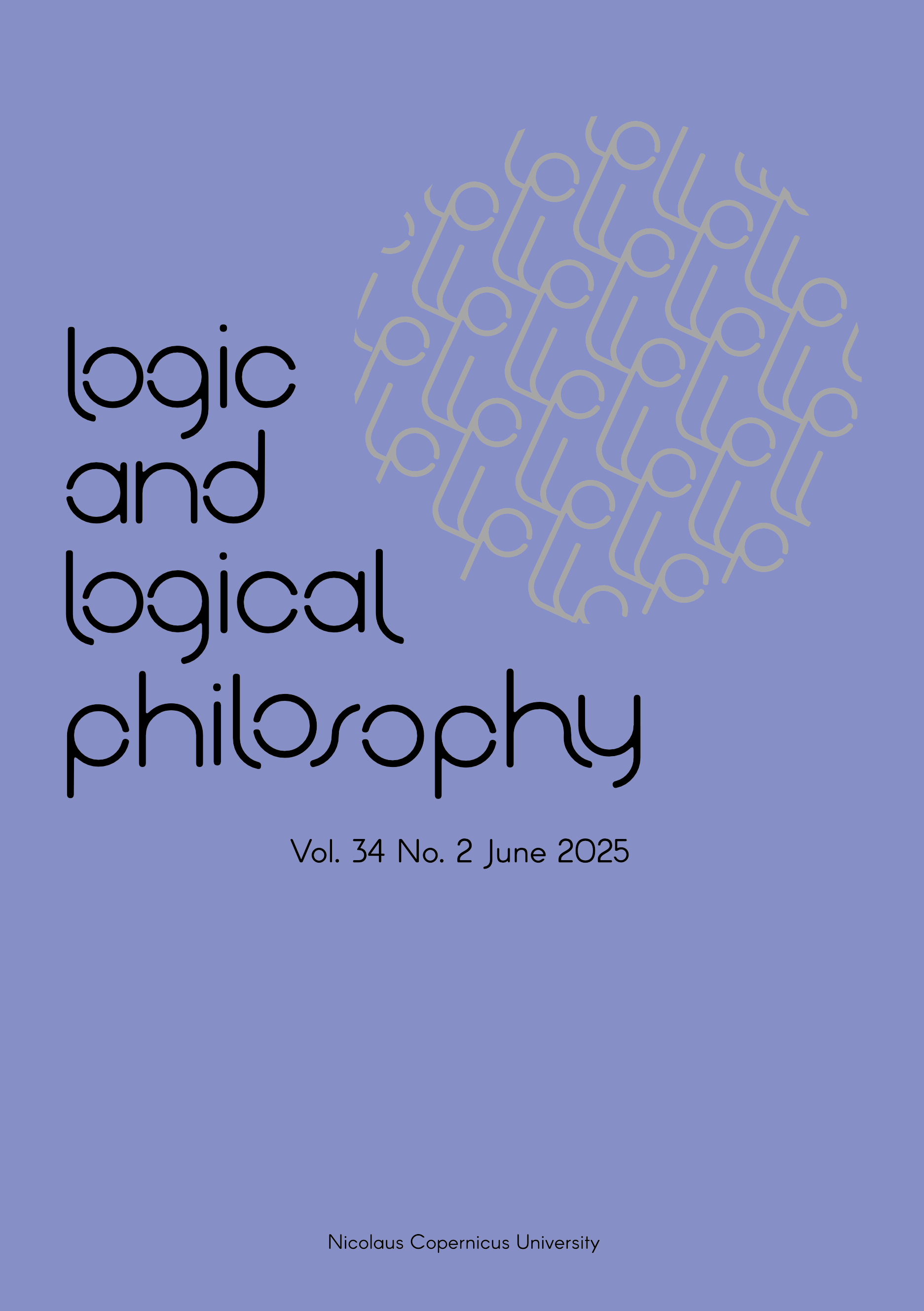Egocentric Doxastic Logic
DOI:
https://doi.org/10.12775/LLP.2024.024Keywords
beliefs, egocentric, axiomatisation, non-rigid namesAbstract
Originally proposed by Prior, egocentric logic is a class of logical systems that capture properties of agents rather than of possible worlds. The article proposes a doxastic egocentric system with rigid names for reasoning about beliefs that an agent might have about herself.
References
Baltag, A., and S. Smets. Conditional doxastic models: A qualitative approach to dynamic belief revision. Electronic Notes in Theoretical Computer Science, 165: 5–21, 2006. DOI: http://dx.doi.org/10.1016/j.entcs.2006.05.034
Baltag, A., and S. Smets. A qualitative theory of dynamic interactive belief revision. Pages 9–58, Chapter 39, in G. Bonanno, W. van der Hoek and M. Wooldridge (eds.) Logic and the Foundations of Game and Decision Theory (LOFT 7), 3, 2008.
Board, O. Dynamic interactive epistemology. Games and Economic Behavior, 49(1): 49–80, 2004. DOI: http://dx.doi.org/10.1016/j.geb.2003.10.006
Boutilier, C. Conditional logics of normality: A modal approach. Artificial Intelligence, 68(1): 87–154, 1994. DOI: http://dx.doi.org/10.1016/0004-3702(94)90096-5
Christoff, Z., and J. U.Hansen. Alogic fordiffusion in social networks. Journal of Applied Logic, 13(1): 48–77, 2015. DOI: http://dx.doi.org/10.1016/j.jal.2014.11.011
Christoff, Z., J. U. Hansen, and C. Proietti. Reflecting on social influence in networks. Journal of Logic, Language and Information, 25(3): 299–333, 2016. DOI: http://dx.doi.org/10.1007/s10849-016-9242-y
Epstein, S., and P. Naumov. Epistemic logic of know-who. Proceedings of the AAAI Conference on Artificial Intelligence, 2021. DOI: http://dx.doi.org/10.1609/aaai.v35i13.17367
Epstein, S., P. Naumov, and J. Tao. An egocentric logic of de dicto and de re knowing who. Journal of Logic and Computation, 2023. DOI: http://dx.doi.org/10.1093/logcom/exad053
Fagin, R., J. Y. Halpern, Y. Moses, and M. Y. Vardi. Reasoning about Knowledge. MIT Press, Cambridge, MA, 1995. DOI: http://dx.doi.org/10.7551/mit-press/5803.001.0001
Friedman, N., and J. Y. Halpern. Modeling belief in dynamic systems, part I: Foundations. Artificial Intelligence, 95(2): 257–316, 1997. DOI: http://dx.doi.org/10.1016/S0004-3702(97)00040-4
Friedman, N., and J. Y. Halpern. Modeling belief in dynamic systems, part II: Revision and update. Journal of Artificial Intelligence Research, 10: 117–167, 1999.
Girlando, M., S. Negri, N. Olivetti, and V. Risch. The logic of conditional beliefs: Neighbourhood semantics and sequent calculus. Pages 322–341 in L. Beklemishev, S. Demri and A. Màté (eds.) Advances in Modal Logic 2016. College Publications, 2016.
Girlando, M., B. Lellmann, and N. Olivetti. Nested sequents for the logic of conditional belief. ELIA – European Conference on Logics in Artificial Intelligence, 2019. https://hal.science/hal-02077057v1/file/Nested_sequents_for_the_logic_of_conditional_belief.pdf
Grove, A. J. Naming and identity in epistemic logic; Part II: a first-order logic for naming. Artificial Intelligence, 74(2): 311–350, 1995.
Grove, A. J., and J. Y. Halpern. Naming and identity in a multi-agent epistemic logic. Pages 301–312 in J. F. Allen, R. Fikes and E. Sandewall (eds.), Proceedings of the 2nd International Conference on Principles of Knowledge Representation and Reasoning (KR’91). Cambridge, MA, 1991.
Grove, A. J., and J. Y. Halpern. Naming and identity in epistemic logics; Part I: the propositional case. Journal of Logic and Computation, 3(4): 345–378, 1993. DOI: http://dx.doi.org/10.1093/logcom/3.4.345
Jiang, J., and P. Naumov. The egocentric logic of preferences. Pages 2676–2682 in The 31st International Joint Conference on Artificial Intelligence, 2022. DOI: http://dx.doi.org/10.24963/ijcai.2022/371
Jiang, J., and P. Naumov. In data we trust: The logic of trust-based beliefs. Pages 2683–2689 in the 31st International Joint Conference on Artificial Intelligence, 2022. DOI: http://dx.doi.org/10.24963/ijcai.2022/372
Jiang, J., and P. Naumov. A logic of higher-order preferences. Synthese, 203:210, 2024. DOI: http://dx.doi.org/10.1007/s11229-024-04655-3
Lewis, D. K., Counterfactuals. Harvard University Press, 1973.
Marx, M., and Y. Venema. Multi-Dimensional Modal Logic. Springer, 1997. DOI: http://dx.doi.org/10.1007/978-94-011-5694-3
Mendelson, E. Introduction to Mathematical Logic. CRC press, Boca Raton, Florida, 2009.
Meyer, J.-J. C., and W. van der Hoek. Epistemic Logic for AI and Computer Science. Cambridge University Press, 2004. DOI: http://dx.doi.org/10.1017/CBO9780511569852
Naumov, P., and K. Ros. Comprehension and knowledge. Pages 11622–11629 in The Thirty-Fifth AAAI Conference on Artificial Intelligence, 2021.
Naumov, P., and J. Tao. An egocentric logic of knowing how to tell them apart. The Journal of Symbolic Logic, 2023. DOI: http://dx.doi.org/10.1017/jsl.2023.45
Prior, A. N. Egocentric logic. Noûs, 2(3): 191–207, 1968. DOI: http://dx.doi.org/10.2307/2214717
Sano, K. Axiomatizing hybrid products: How can we reason many-dimensionally in hybrid logic? Journal of Applied Logic, 8(4): 459–474, 2010. DOI: http://dx.doi.org/10.1016/j.jal.2010.08.006
Seligman, J., F. Liu, and P. Girard. Logic in the community. Pages 178–188 in Logic and Its Applications. Springer, 2011. DOI: http://dx.doi.org/10.1007/978-3-642-18026-2_15
Seligman, J., F. Liu, and P. Girard. Facebook and the epistemic logic of friendship. Pages 229–238 in 14th conference on Theoretical Aspects of Rationality and Knowledge (TARK’13), 2013.
van Eijck, J., and K. Li. Conditional belief, knowledge and probability. Pages 188–206 in Proceedings of the 16th Conference on Theoretical Aspects of Rationality and Knowledge, 2017.
Downloads
Published
How to Cite
Issue
Section
License
Copyright (c) 2024 Pavel Naumov, Chenyang Wu

This work is licensed under a Creative Commons Attribution-NoDerivatives 4.0 International License.
Stats
Number of views and downloads: 1081
Number of citations: 0







